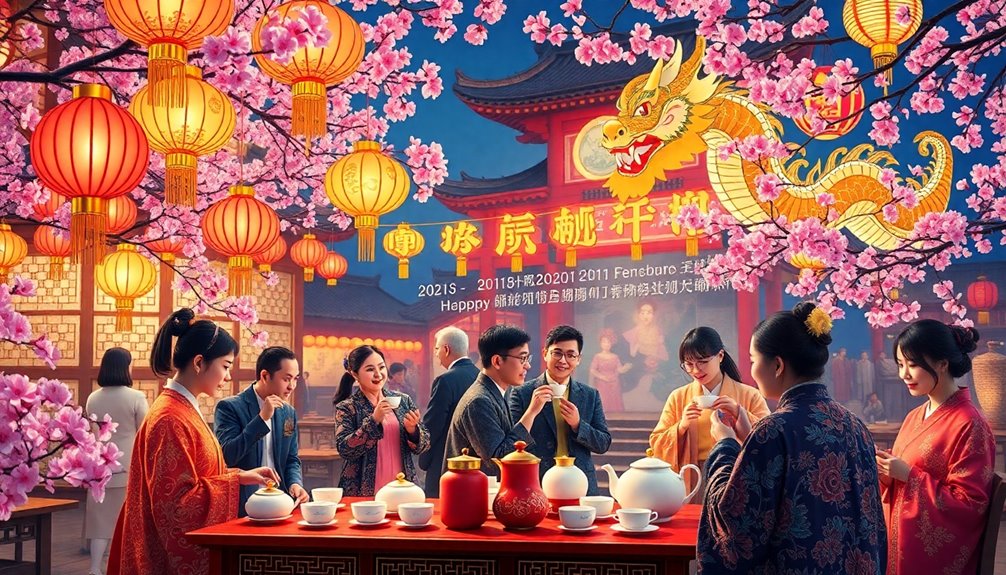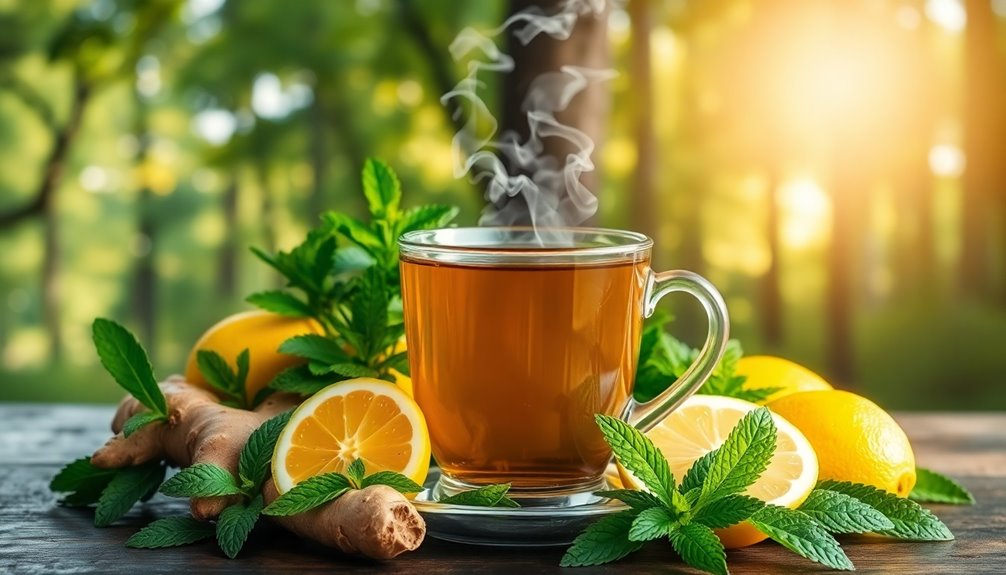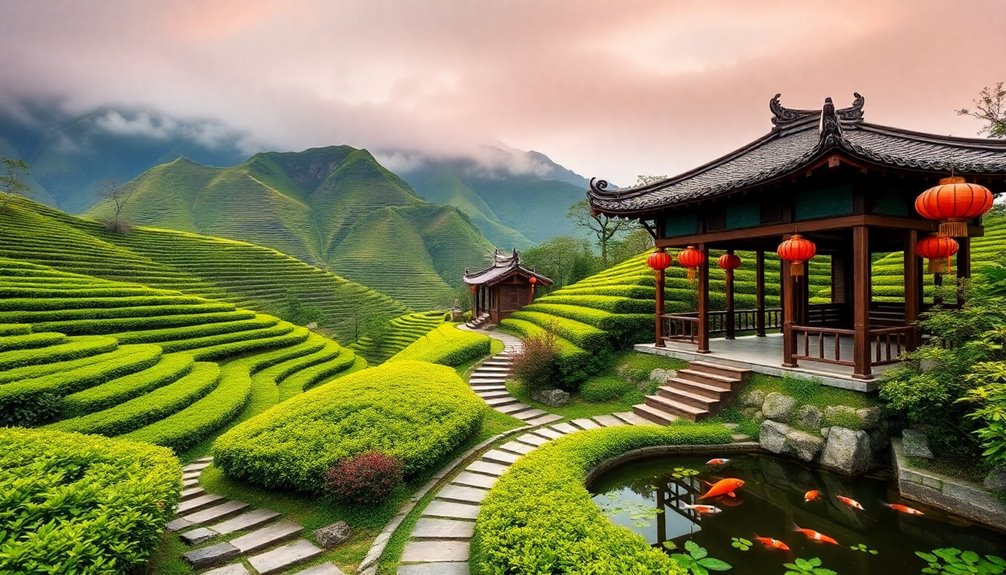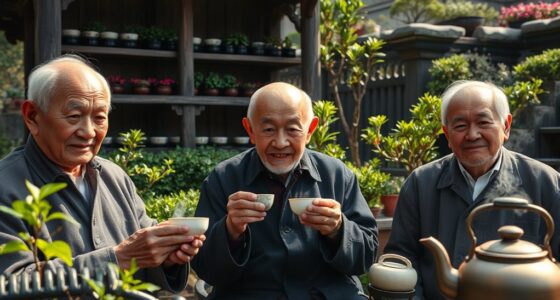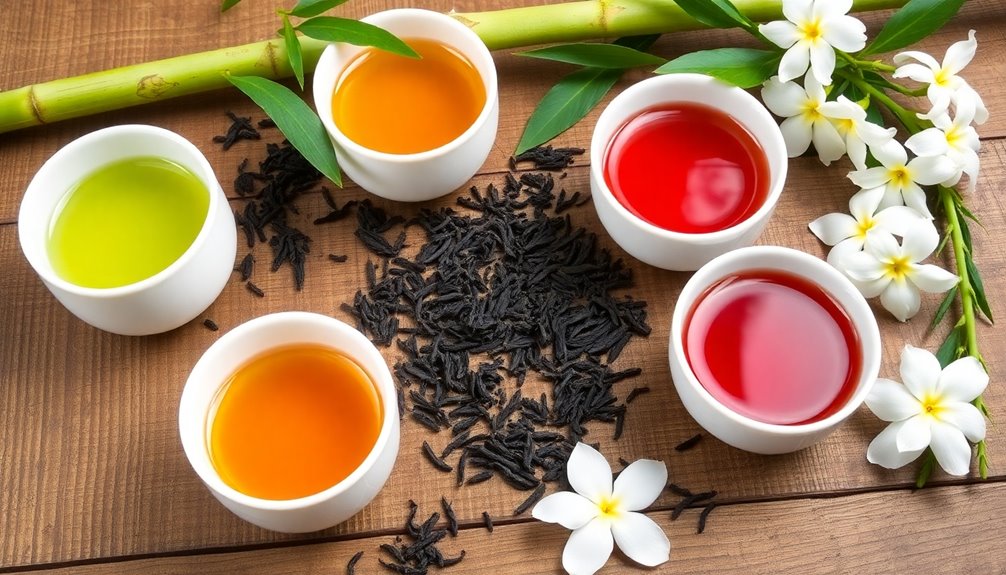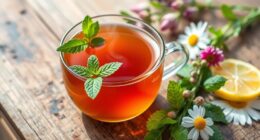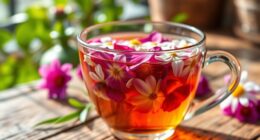Tea's role in Chinese festivals and celebrations is profound. It symbolizes prosperity and unity, making it a focal point during events like Chinese New Year and the Mid-Autumn Festival. By sharing tea, you strengthen family bonds and honor your cultural heritage. Different teas, such as Longjing during New Year and Oolong with mooncakes, enhance festive meals. Tea ceremonies during weddings express respect and gratitude, emphasizing family unity. Each region has its unique tea traditions, showcasing China's rich diversity. If you're curious about how tea rituals shape these celebrations, you'll uncover even more fascinating insights.
Key Takeaways
- Tea symbolizes prosperity and unity during Chinese festivals, enhancing the spirit of togetherness and cultural heritage.
- Specific tea varieties like Aged Pu-erh, Oolong, and Green tea elevate festive experiences and complement traditional foods.
- Tea rituals during celebrations strengthen family bonds through storytelling and shared experiences, making gatherings more meaningful.
- Regional variations in tea practices reflect local customs and enhance celebration experiences, showcasing the diversity of Chinese culture.
- Engaging in authentic tea practices fosters respect and appreciation for Chinese traditions, countering the effects of cultural appropriation.
Introduction
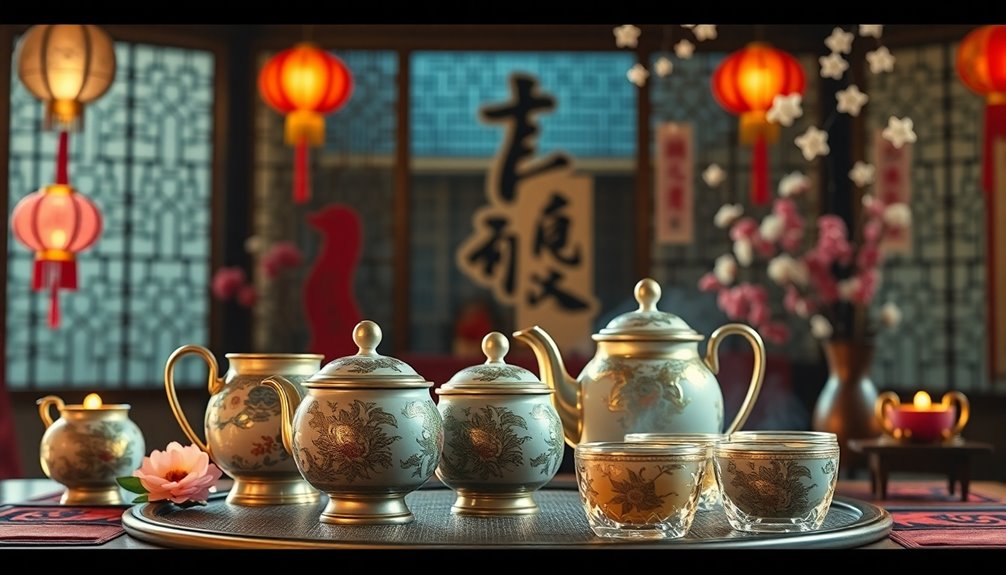
Tea plays a pivotal role in Chinese festivals, acting as a symbol of prosperity and unity. You'll find that during joyous occasions like Chinese New Year, Mid-Autumn Festival, and Dragon Boat Festival, certain teas are enjoyed to enhance the festive spirit.
These gatherings are more than just social events; they're opportunities to strengthen family bonds and honor cultural heritage. As you partake in tea traditions, you'll notice how these rituals foster connections across generations, emphasizing respect and appreciation within the family.
Each festival carries its unique tea ceremonies that not only reflect specific cultural values but also serve as a social connector among attendees. Sharing tea during these celebrations promotes storytelling and shared experiences, weaving together the rich tapestry of Chinese tea culture.
The act of brewing and sipping tea allows you to partake in a tradition that transcends time, reinforcing community ties. In essence, tea isn't merely a beverage; it embodies the spirit of togetherness and harmony that defines Chinese festivals, reminding everyone present of their shared history and aspirations for prosperity.
Tea's Role in Celebrations
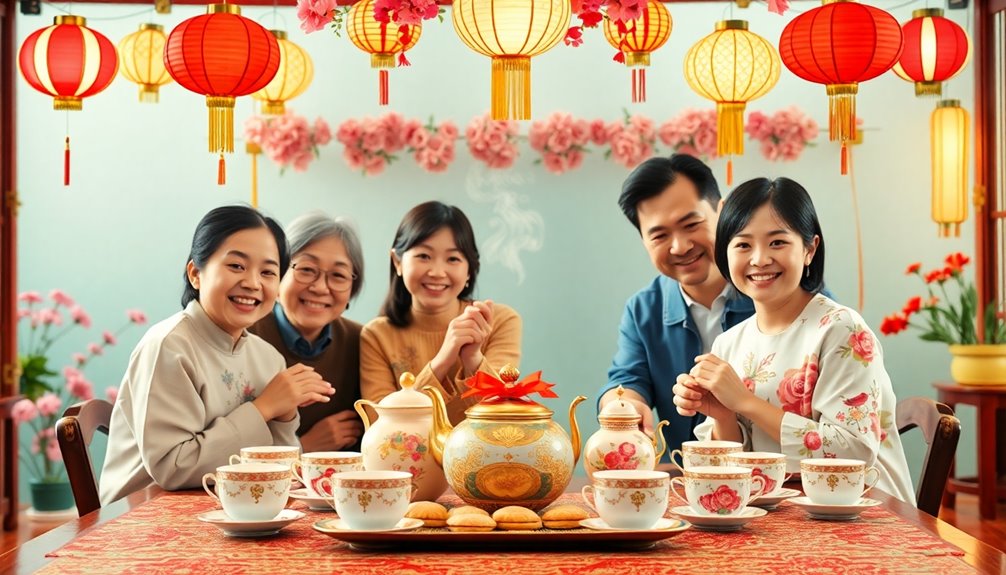
While celebrating major Chinese festivals, the presence of specific teas transforms the atmosphere, creating a vibrant backdrop for family and friends to come together.
During Chinese New Year, Aged Pu-erh and Longjing tea symbolize new beginnings, fostering family gatherings centered around tea preparation and consumption. As you share stories and laughter, these teas enhance the festive spirit and reinforce bonds.
At the Mid-Autumn Festival, tea drinking is intertwined with the legend of Chang'e, deepening storytelling traditions and creating shared experiences. You might sip on fragrant Oolong tea, which complements the mooncakes and enriches your connection with loved ones.
During the Dragon Boat Festival, Green tea and Oolong tea pair beautifully with zongzi, aiding digestion and strengthening social connections among participants. The meticulous tea preparation rituals emphasize the appreciation of aroma and flavor, preserving cultural heritage while enhancing the festive atmosphere.
Each type of tea you choose not only reflects the harmony of flavors but also elevates the overall experience of the celebration.
Through these traditional practices, tea plays an essential role in making your family gatherings memorable and meaningful.
Tea's Significance in Weddings
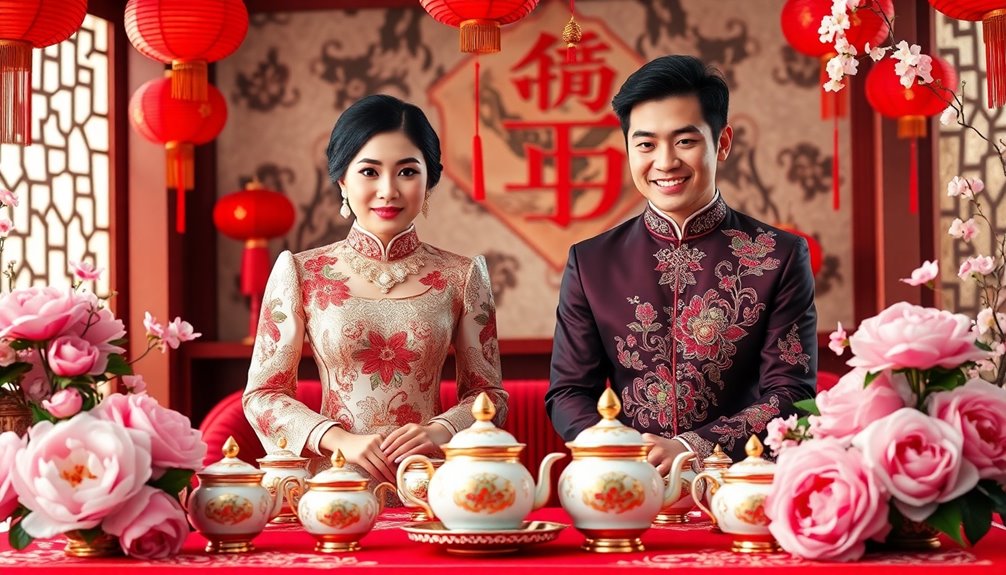
A traditional Chinese wedding wouldn't be complete without the heartfelt tea ceremony, a meaningful ritual that highlights respect and gratitude. During this ceremony, you serve tea to your parents, symbolizing your appreciation for their upbringing and support. The tea you choose is often a high-quality variety, like Longjing or Tieguanyin, reflecting the sacrifices they've made for you.
You'll typically start by serving tea to your parents, followed by your partner serving their parents, emphasizing the unity and blending of both families. This act reinforces the cultural significance of respecting elders in Chinese society.
In addition to parents, you may also serve tea to other elder family members and guests, further showcasing your gratitude and respect.
The tea ceremony often includes the exchange of red envelopes filled with money or gifts, which adds to the atmosphere of prosperity and good fortune surrounding your marriage.
Through this ritual, you not only honor your past but also set a positive tone for your future together, making it a cornerstone of Chinese weddings. This ceremony beautifully intertwines traditions with hopes for a prosperous life ahead.
Regional Tea Variations in Festivals
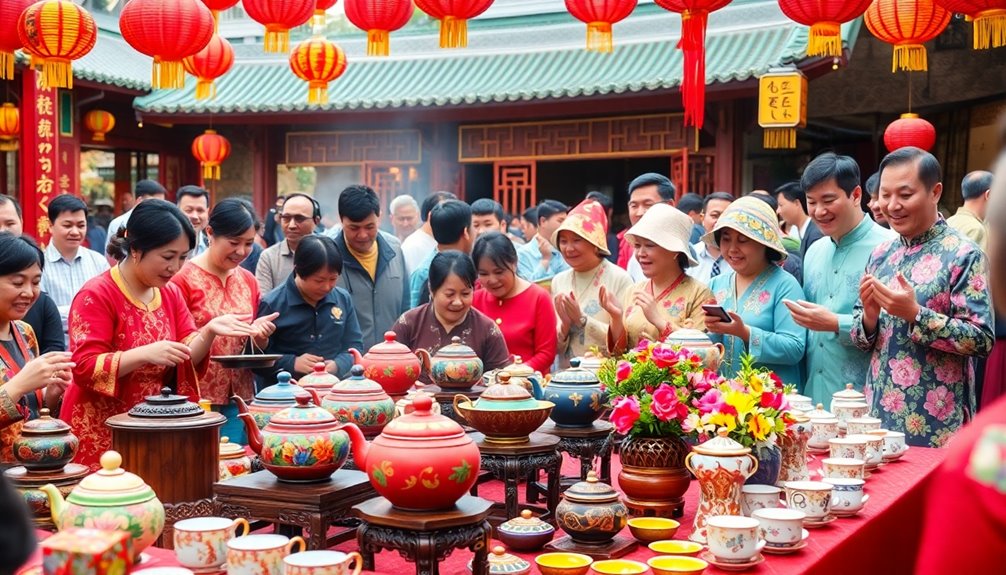
Celebrations in Chinese culture often feature a variety of teas that reflect regional preferences and the significance of the occasion. During the Lunar New Year, you might notice families in southern China enjoying aged Pu-erh tea, symbolizing longevity, while those in the north prefer Longjing tea for its refreshing qualities.
The Mid-Autumn Festival showcases green tea in coastal areas, perfectly complementing mooncakes, while Oolong tea shines in Fujian province, enhancing local dishes.
At the Dragon Boat Festival, different regions pair zongzi with specific teas; for instance, Guangdong locals favor Oolong tea to aid digestion after indulging in rich sticky rice dumplings.
In Tibet, the Shoton festival features butter tea, a unique blend of tea, butter, and salt, reflecting the area's distinct cultural take on tea.
Meanwhile, during the Lantern Festival, jasmine tea is a common sight, enriching the flavors of sweet dumplings and symbolizing new beginnings.
These regional variations highlight how tea isn't just a beverage in China; it's a vital part of the cultural fabric woven throughout festivals and celebrations.
Cultural Appropriation of Tea Practices

Cultural appropriation of tea practices often strips away the depth and meaning behind traditional Chinese rituals, leading to a superficial understanding of their significance. When non-Chinese communities adopt Chinese tea ceremonies without grasping their historical context, it results in a diluted version of the rich customs surrounding tea drinking.
In modern China, offering tea isn't just a beverage choice; it's a symbol of respect and connection during festivals and family gatherings.
You might notice fusion tea shops or cafes using Chinese tea types and brewing methods, but often these versions lack authentic representation. This blending can lead to misunderstandings about the spiritual and social roles tea plays in traditional Chinese culture.
The history of tea, with its intricate ties to Chinese identity, deserves a more profound appreciation than mere commercialization.
To prevent cultural appropriation, it's crucial to engage in respectful engagement and educate yourself about the origins and meanings of these tea practices.
Practical Applications
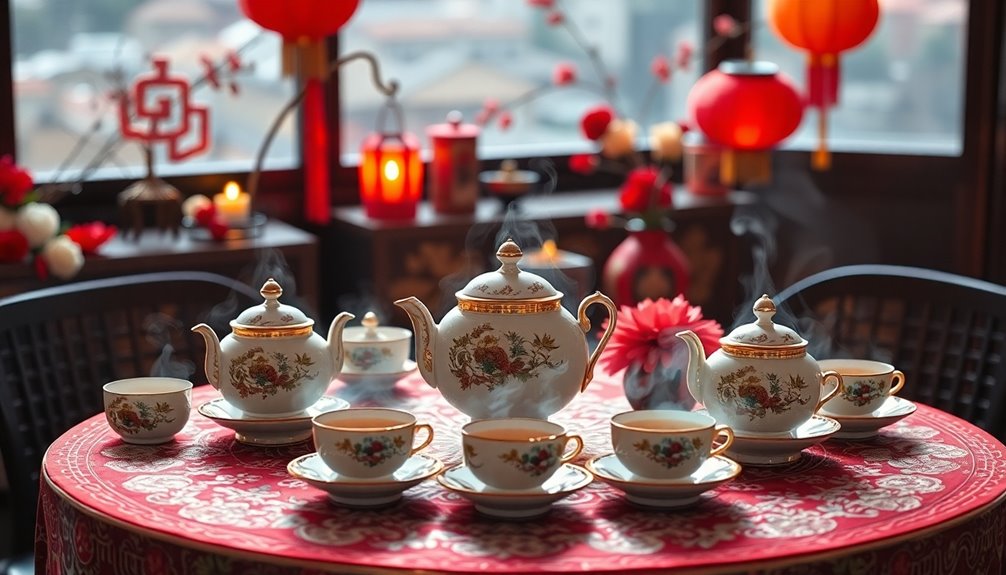
Understanding the significance of tea in Chinese festivals opens up practical ways to incorporate these traditions into your own celebrations.
You can start by selecting specific types of traditional tea for different occasions. For instance, during Chinese New Year, serve aged Pu-erh tea to symbolize new beginnings and enhance the festive atmosphere. Pairing green tea with lighter dishes or zongzi during the Dragon Boat Festival aids digestion and encourages shared tea experiences that reinforce family bonds.
Consider hosting a tea preparation session as part of your festivities. This can be a delightful way to appreciate the aroma and flavor of the tea while preserving aspects of Chinese culture.
During the Mid-Autumn Festival, gather your family and enjoy tea drinking while sharing stories about the legend of Chang'e, fostering cultural continuity.
Conclusion
In conclusion, tea isn't just a beverage in Chinese culture; it's a vital part of festivals and celebrations. Whether you're sipping it at a wedding or enjoying regional variations during a festival, tea connects you to traditions and heritage. Recognizing its significance helps you appreciate the deeper meanings behind these practices. So, the next time you partake in a tea ceremony or celebration, remember that you're embracing a rich tapestry of history and culture.

